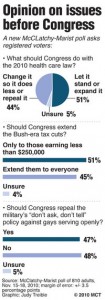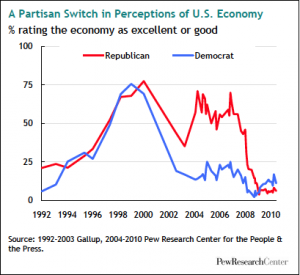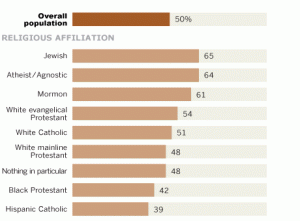On March 25, 2010, the Politicker blog on CNN posted a story that lead with the headline:
Polls indicate support for health care reform up since vote
They offer this quick summary: “According to new polls, support for the health care reform bill has increased as a result of Sunday’s approval the legislation by the House.”
The article provided this information:
“Two of the surveys, by CBS News and Quinnipiac University, asked virtually the same question about health care both before and after Sunday’s vote, and in both polls support for the legislation rose by four to five percentage points.”
….
“CBS asked what Americans thought of “the current health care reform bill.” Quinnipiac asked what Americans thought of “the changes in health care passed by Congress.” These questions concentrated on the ‘contents’ of the bill. CBS indicated 42 percent approving of the bill; Quinnipiac indicated 40 percent approval. Forty-six percent of those questioned in the CBS poll disapproved of the bill, with 49 percent of those questioned by Quinnipiac disapproving of the legislation.”
They do not provide any comparison before and after. Maybe they forgot. But we readers have no way of knowing whether the “increase” was within sampling error. If the sampling error on the polls is the traditional +/-3 percent, there would have to be more than 6% difference to be outside of the range of just sampling error. But they do not provide any detail about the size of the samples or the sampling error, or the prior survey results.
The main problem with this article, however, is the spin. We are left with the impression that people are now OK with the health bill that the House passed it. But when you look at the reported data, less than a majority approve of this bill and almost half the people disapproved of the bill. The reasons likely vary–some disapprove because they don’t think government should be in the health care insurance business, they fear it will increase their costs, or they dislike the idea of mandates and IRS being the enforcers, while others dissappove because it did not provide a government option or did not create a single-payer system.
What is clear, however, –at least from my interpretation of this data–is that the American people remain divided on this legislation, despite the positive spin.
http://politicalticker.blogs.cnn.com/2010/03/25/polls-indicate-support-for-health-care-reform-has-increased-since-sunday-vote/?fbid=f2p5JbqQ-b–
 It is hard to understand why voters vote, perhaps because their are a variety of issues and emotions that influence elections. And then there is spin–which has little regard for data as it tries to convince us of an ideological “truth.”
It is hard to understand why voters vote, perhaps because their are a variety of issues and emotions that influence elections. And then there is spin–which has little regard for data as it tries to convince us of an ideological “truth.”



